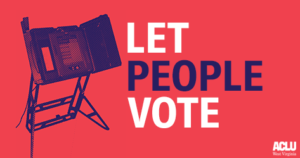The 2016 Voter ID law is now in effect. The ACLU-WV was active in opposing that law and we continue to oppose anything that can be used to suppress votes. Even still, credit is due to the Secretary of State for implementing a free ID program and a robust non-partisan effort at voter education in the face of implementing the new law.
An information sheet listing the acceptable forms of ID and frequently asked questions relating to the new law is available on the West Virginia Secretary of State’s website. Below is a quick recap about the law and what it means going into election season this year.
What Forms of ID Are Valid?
In 2016, the WV Legislature passed a voter ID law that went into effect on January 1, 2018. The following forms of identification are valid and acceptable at polling stations in West Virginia:
- West Virginia driver's license or ID card
- Driver's license issued by another state
- U.S. Passport
- Photo employee identification card issued by the U.S. Government or State of West Virginia
- Student identification card issued by an institution of higher education in WV or high school in WV
- Military identification card with photo issued by the United States
- Concealed carry permit with a photograph
- Medicare or Social Security card
- Birth certificate
- Voter registration card issued by a county clerk in the State of West Virginia
- Hunting or fishing license issued by the State of West Virginia
- Identification card issued by the West Virginia Supplemental Nutrition Assistance Program
- Identification card issued by the West Virginia Temporary Assistance for Needy Families program
- West Virginia Medicaid card
- Bank or debit card
- Utility bill issued within six months of the date of the election
- Bank statement issued within six months of the date of the election or a health insurance card.
- Alternatively, voters can have any adult who has known them for at least 6 months who has a valid photo ID accompany them to the polls, and sign an affidavit attesting that the voter is who they claim to be. Finally, a poll worker who knows the voter can allow them to vote without any form of ID. The law also required the Secretary of State to implement a voter education component and develop a program for issuing free ID’s.
The Stakes Are High
The ACLU-WV takes a strong stand against voter ID laws in any form. There has always been a tension in America between the ideal that every person has an equal say in choosing their representatives and the reality which has often restricted access to the political process for marginalized communities. Voter ID laws are the most recent iteration of the latter. Certain groups, often marginalized, are less likely to have photo ID’s or certain types of IDs and are restricted from voting. North Carolina was an egregious example of this. Even when voter ID laws are more permissive, like West Virginia’s, they can suppress votes. This inevitably leads many voters to not even try to go to the polls because they only see that there is an ID law in effect.
When voter ID laws are passed, education is vital to counteracting the suppression. Secretary of State Warner’s efforts to bring together a group of stakeholders from across the state and across the political spectrum to engage them in voter education is commendable. Likewise, the implementation of a free ID program will help reduce the effects of suppression and could be a valuable resource for individuals who are unable to access other basic services because they lack a valid photo ID. We are happy to support the Secretary of State in both programs that will alleviate the harm done by the passage of the 2016 Voter ID law.

